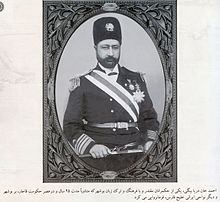Ahmad Khan Daryabeigi
This article includes a list of general references, but it lacks sufficient corresponding inline citations. (October 2014) |
Ahmad Khan Daryabeigi | |
|---|---|
 | |
| Died | August 30, 1923 |
| Nationality | Iranian |
| Occupation(s) | Head of Military School in Tabriz, Head of Fars Military |
| Title | Governor of Bushehr and Ports and Ommanat |
Ahmad Khan Daryabeigi (Persian: احمد خان دریابیگی) was an Iranian military officer and educator.
Early life[edit]
His father was Mohammad Khan and his brother was Mohammad Hosseine Khan. He graduated from Dar ul-Funun school with degrees in engineering and military studies.
Career[edit]
His research in 1887 provided the landscape for official Iranian claims to the islands of Greater and Lesser Tunbs and Abu Musa.[1] During Naser al-Din Shah Qajar, he became the first Iranian captain of the Persepolis Battleship in Bushehr that Iran had recently purchased from Germany. He designed the first Iranian Navy uniform and later became the Lord Admiral (Maritime Frontier-Keeper) of the Persian Gulf.[2] In 1893, he became the Governor of Bushehr and Southern Ports and Ommanat.[3][4] In March 1899, he conquered Port of Lingeh (Bandar Lengeh) and returned it to Iran's sovereignty.[5]
In 1900, he established “Madreseye Sa'adat”, the first modern school through the South and Persian Gulf.[6] He translated The Decameron (from Giovanni Boccaccio)[7] and Nouvelli (from Augustin Eugène Scribe)[8] during 1903–1904 from French.
During the constitutional revolution, he cooperated with Sardar As'ad Bakhtiari (Ali-Qoli Khan Bakhtiari),[9] but he opposed Seyed Morteza Ahrami (Alamal-Hoda) and Seyed Abdolhossein Lari[10] and in one period he faced the wrath of Ayatollah Kazem Khoarasani.[11] Anjomane Nesvan[12] (“Female Forum”) was held in his paternal and fraternal home.
He was discharged in January 1907 after Mohammad Ali Shah Qajar came to power, but was reinstated in August 1907. He settled disputes with the British in Sistan and Baluchestan Province during 1907–1908.[13] He held the governorship of Bushehr and Southern Ports and Ommanat in several periods until shortly after the First World War.[14]
Personal life[edit]
His tenure ended in 1921 shortly after the coup d'état of February 1921 and after Ahmad Shah Qajar’s return from Europe. He died on August 30, 1923.[10][14]
References[edit]
- ^ مهدوی، هوشنگ.(۱۳۵۵)، عبد الرضا هوشنگ، تاریخ روابط خارجی ایران، تهران، سیمرغ
- ^ رسایی، دریابد فرجالله، ۲۵۰۰ سال برروی دریاها، پیک دریا، تهران، ۱۳۵۰
- ^ مجله رشد آموزش تاریخ - شماره ۲ - تاریخچه مدرسه سعادت بوشهر
- ^ "مراکز فرهنگی هنری بوشهر". artbushehr.ir. Archived from the original on 2012-02-13. Retrieved 2012-02-17.
- ^ وقایع اتفاقیه، ۲۵ شوال ۱۳۱۶ (هشتم مارچ ۱۸۹۹)
- ^ "- نسیم جنوب". nasimjonoub.com.
- ^ دکامرون، ترجمهٔ؛ احمد دریابیگی پایگاه اطلاعرسانی کتابخانههای ایران
- ^ نوئلی، ترجمهٔ؛ احمد دریابیگی پایگاه اطلاعرسانی کتابخانههای ایران
- ^ حبل المتین، سال هفدهم. شماره ۳، رجب ۱۳۲۷ ق، ص ۱۶
- ^ a b نقش میرزا احمد خان دریابیگی در تحولات سیاسی خلیج فارس پرتال جامع علوم انسانی
- ^ فارس از مشروطیت تا جنگ جهانی اول، به کوشش دکتر محمد رنجبر، ۱۳۸۹، سازمان اسناد و کتابخانه ملی جمهوری اسلامی ایران، ص ۱۷۷
- ^ "کتابخانه دیجیتال نور: صفحه اصلی". Archived from the original on 2012-07-22. Retrieved 2012-02-17.
- ^ Blackwood's magazine, Volume 208. (1817-1915) p182–183
